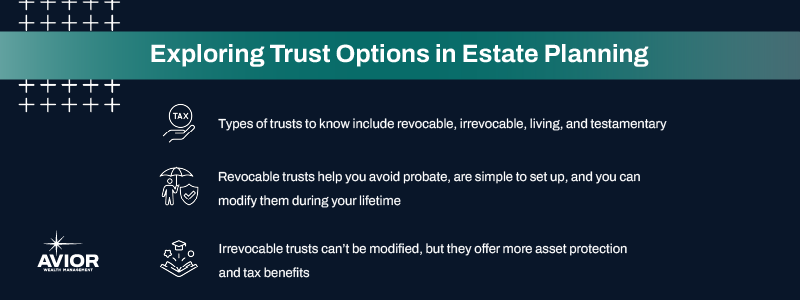Exploring Trust Options in Estate Planning
Trusts can help you strengthen your estate plan. Find out the different types and their benefits for taxes and asset protection.

Trusts are often leveraged in estate plans to ensure assets are protected and are only passed on to chosen beneficiaries. A trustee is designated by the trustor to hold the title to the assets, which will benefit the chosen beneficiary according to the trust’s terms.
A big benefit of establishing a trust is that, when you pass away, the trust’s assets won’t go into probate like other assets would. Trusts, which are legal entities, give you an extra layer of protection to ensure your wishes are met.
This guide helps you explore options to make the right trust choices for your estate planning goals.
Types of trusts
While all trusts serve the purpose of helping you gain control over your assets in estate planning, there are different types that you can use for different goals. Here is a breakdown of the types of trusts to know:
1. Revocable trusts
With revocable trusts, you can modify or revoke the trust during your lifetime, allowing for adaptability. This type of trust becomes irrevocable upon your death when it facilitates the transfer of assets without the need for probate. If maintaining control over your assets during your lifetime is a priority, a revocable trust offers the flexibility to make changes as needed.
2. Irrevocable trusts
Irrevocable trusts, on the other hand, are set in stone once established. You relinquish control over the assets placed in the trust. While the lack of flexibility might seem restrictive, the stability and asset protection offered by irrevocable trusts can be very valuable in certain estate planning scenarios. So, irrevocable trusts provide enhanced asset protection but require a willingness to relinquish control.
3. Living trusts
Living trusts are created during your lifetime. These trusts can be either revocable or irrevocable and serve as a means to manage and distribute assets without the complications of probate. Living trusts are versatile instruments that cater to various estate planning objectives.
4. Testamentary trusts
Unlike living trusts, testamentary trusts only come into existence upon your death, as specified in your will. These trusts allow you to outline specific instructions for the distribution of assets to beneficiaries. Testamentary trusts provide a structured framework for managing assets and can be customized to align with the unique needs of the estate.
Choosing the right trust for your estate plan
Selecting the right trust for your estate planning needs is a crucial step toward ensuring that your wishes are fulfilled and your assets are safeguarded. Let’s now walk through all the factors to consider when making this decision:
- Asset control and flexibility: Consider the level of control and flexibility you want to have over your assets. If you want the ability to modify or revoke the trust during your lifetime, a revocable trust is best. If asset protection and stability are priorities, an irrevocable trust might align better with your objectives.
- Estate details: The size and complexity of your estate help you determine the most appropriate trust to use. For larger estates, avoiding probate and any potential creditors may be a priority, making an irrevocable trust a wise choice.
- Tax implications: Understanding the tax implications of each trust type is essential. Irrevocable trusts, for instance, can provide more tax benefits, which is discussed more in the next section.
- Beneficiary needs: Consider the unique needs and circumstances of your beneficiaries. If you have minor children, a testamentary trust established in your will can provide a structured and controlled means of distributing assets to them over time.
For example, if your goal is to minimize the probate process for heirs, which can take a long time and build unnecessary stress, you may go with a revocable trust to maintain flexibility while you’re alive and ensure a seamless asset transfer. These trusts can also be simpler to create.
If your concern is your beneficiaries facing creditor issues once you’re gone, an irrevocable trust ensures your beneficiaries receive the intended benefits without external claims affecting their inheritance.
Tax implications and asset protection
One significant factor that will impact the choices you make is estate taxes. The assets held in revocable trusts are subject to estate taxes on both a state and federal level.
This is why many people decide to go with an irrevocable trust. These trusts eliminate the assets from your taxable estate, so upon your death, they aren’t subject to estate taxes. Additionally, irrevocable trusts offer that extra asset protection. These assets aren’t subject to probate and external parties cannot make claims to the assets.
Even with the additional protection and tax minimization that irrevocable trusts provide, they take a bit more legwork to establish. And, remember that they cannot be modified without beneficiary permission or a court order. Weigh these pros and cons carefully.
Trustees and trust administration
Once a trust is established, administration and management begin. This involves overseeing the trust’s assets, distributing funds, and ensuring your intentions are faithfully executed.
The trustee is tasked with managing the trust’s assets, making investment decisions aligned with your goals, and maintaining accurate records. This person must adhere to legal and ethical standards, ensuring that the trust operates within the boundaries defined by the trust document and relevant laws.
Navigating trust administration comes with its share of challenges. Balancing the interests of multiple beneficiaries, addressing potential conflicts, and staying abreast of changing legal and financial landscapes are inherent challenges. Additionally, market fluctuations and economic uncertainties pose potential hurdles, underscoring the importance of strategic financial planning by the trustee.
This is why choosing the right trustee or trust management solution is a must. They should possess the financial expertise and competence to navigate all the complexities of administration. Effective communication and transparency about performance also need to be continuously present for success.
Careful consideration in selecting the right trustee ensures that this process unfolds with diligence, integrity, and a commitment to preserving the legacy you’ve entrusted to them.
Understanding trust options for better estate planning
A trust can be your secret weapon for an effective estate plan. This legal tool can provide an extra layer of protection, tax benefits, and security that your assets will be distributed according to your wishes. Selecting the right option for your goals is key.
Work with the wealth management advisors at Avior for expert guidance on trusts and estate planning support. Contact us today to get started.
Disclaimer: Nothing contained herein should be construed as legal or tax advice. Avior and our Advisors will work with your attorney and/or tax professional to assist with your legal and tax strategies. Please consult your attorney or tax professional with specific legal and/or tax questions. Investment Management and Financial Planner are offered through Avior Wealth Management, LLC, an SEC-registered investment advisor. Past performance is not a guarantee of future results. Investments are subject to loss, including the loss of principal.
No Comments
Sorry, the comment form is closed at this time.




